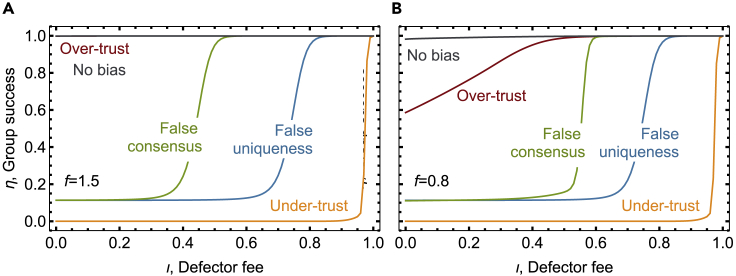Figure 6.
Perception biases affect the effectiveness of monetary incentives (such as a fee to be paid by defectors)
Incentives, like reward or punishment, are often used to move populations from unfavorable to favorable equilibria. The effectiveness of incentives, however, depends on the level and nature of biases existent in a population. Here, we measure group success, i.e., the fraction of groups that, on average, have the necessary number of cooperators to reap the benefits of collective action. We explore a game setting in which unbiased individuals self-organize toward high levels of group success. In a population with individuals that over-trust (χ = δ = 0.6), extra incentives are unnecessary to achieve group success if full cooperation is an equilibrium (panel A, f = 1.5); incentives also improve cooperation when individuals over-trust and if there is no incentive for cooperation above the threshold of group success (panel B, f = 0.8). In this case, over-trusting individuals may refrain from cooperating when they erroneously believe that the collective success threshold was already achieved. If individuals incur in false consensus (χ = −δ = 0.6), a lower punishment on defectors (or conversely, reward to cooperators) is necessary, compared with a scenario of false uniqueness (χ = −δ = −0.6). Finally, in a population with individuals that under-trust (χ = δ = −0.6), monetary incentives are ineffective to a large extent. Same parameters as Figure 3. Other parameters: Z = 100, β = 10, μ = 0.05.
See also Figures S2–S5 for an extended exploration of incentives and biases in other games, as well as an exploration of different population sizes, group sizes, and selection intensities. See Figure S6 for heterogeneous, normally distributed biases in a population.

